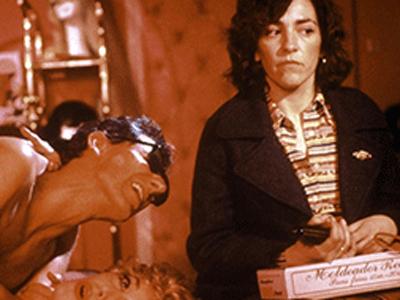Is there a single Pedro Almodovar big-screen moment? You be the judge as San Francisco's Roxie Theater hosts a retrospective of the brilliant Spanish filmmaker's seldom-seen early works. Early Almodovar Week runs at the Roxie from Fri.-Thurs., May 20-26.
Since a deliciously dark sense of humor, black at times but also humane, dominates Almodovar's world view, it's useful to recall how most Americans received their first inklings of the motion-picture deluge to come. "This just in from Spain. Generalissimo Francisco Franco is still dead." That 1975 headline on Saturday Night Live's Weekend Update may go down as one of the most prophetic news bulletins ever delivered on American TV. Four decades later, General Franco is still dead, and the nearly three dozen films from Almodovar are still the best artistic guide to the extraordinary period of democracy and personal freedoms that overtook a society previously thought to be one of the most repressive on the planet.
The most acclaimed Spanish film writer-director since the great Luis Bunuel, Almodovar was born in the small village of Calzada de Calatrava, literally the "Man from La Mancha," the impoverished Spanish region. The future genius director popped up in Madrid in the turbulent year of 1968, so poor he was reduced to selling used stuff at a local flea-market called El Rastro. A blessing in deep disguise at the time, Almodovar's lack of film-school-training led him to experiment with stories and performers, especially talented actresses who would leave their mark on his now-34-film career. Almodovar's distinguishing skill is his ability to mix genres with an outlandish humor that leaves would-be critics of his sexual politics speechless.
What Have I Done To Deserve This? (1984) Almodovar taught himself cinema storytelling with a Super 8 camera he bought while working for the phone company. His American reputation kicked off with the deliciously anarchic "WHIDTDT?," featuring the spunky work of Carmen Maura as a meth-addicted Madrid housewife whose taxi-driving lout of a husband is not only cheating and failing to support her, but has collaborated with a German mistress to fabricate a book of Hitler diaries. The film may have left American filmgoers nonplussed with its non-moralizing approach to a mother paying for orthodontic work by agreeing to have her barely teenage son adopted by a boy-loving dentist. (5/22, 23)
Law of Desire (1987) Three years later, Maura starred as the transsexual sister of an openly gay filmmaker. In my favorite Pedro moment, Maura's Tina is walking down a sultry Madrid street with her brother and a young girl they have rescued from the clutches of her self-absorbed mother. Overcome by the heat, Tina spots a municipal streetcleaner hosing down the cobblestones and demands that he turn the hose on her. The new queer-style family is united in an orgasmic episode that corresponds to the extraordinary scene when Marcello Mastroianni tumbles into a Roman fountain in Federico Fellini's pioneering "La Dolce Vita." (5/21, 26)
Pepi, Luci, Bom (1980) This early, hyper-low-budget soap opera can probably best be likened to early John Waters. If raunchy situations and over-the-top hapless heroines offend you, give this one a pass. In brief: Pepi (Carmen Maura) goes from heiress to rape victim to ad executive. Meanwhile the wife of Pepi's rapist, Luci (Eva Siva), leaves the jerk to jumpstart a lesbian affair with Bom (Olivido Gara), a Madrid rock singer. The film was conceived and shot during Almodovar's poverty period, and its best claim on our attention nearly four decades later is its depiction of the crazy shoestring world of struggling wannabe artists from various walks of life and positions on the Kinsey Scale. Just remember: The Spanish sense of humor differs markedly from most American brands, especially from those advocating political correctness. (5/21, 24)
Women on the Verge of a Nervous Breakdown (1988) This commercial-breakthrough screwball comedy features a woman (Carmen Maura) so angry at a disappearing boyfriend that she practically erupts into flames - indeed, her bed does ignite. Inspired by a Jean Cocteau play, "Women" features some memorable comic misadventures, including the interference with a police investigation when two cops are served drug-laced gazpacho. With Antonio Banderas, Julieta Serrano and Rossy de Palma. (5/20, 25)
Tie Me Up! Tie Me Down! (1989) This black comedy-melodrama marks the beginning of Almodovar's problems with the more squeamish elements of his growing American audience. One-time-porn-star-turned-drug-addict Marina (Victoria Abril) is abducted by a just-released mental patient (a career-defining turn for Antonio Banderas) who proceeds to tie her up and rape her so that they can start a family together. This film would jump-start Banderas' American career ("Philadelphia") and lead him down the slippery path where he wound up playing Paul Dano's dad in the domestic comedy "Ruby Sparks." In our 1994 chat, Almodovar predicted big things for Banderas in Hollywood once he polished up his English skills. "Antonio has this kind of intuitive, very American, very physical style of acting." He felt Banderas would shine in American films once our directors learned how to put his style of sex villainy to good use. (5/21, 25)
High Heels (1991) A singer (Marisa Paredes) attempts to get back with her long-estranged daughter (Victoria Abril). The daughter has moved on, carving out a career as a TV news anchor and an off-screen role as the lover of the station's owner who, as luck would have it, is one of Mom's ex-boyfriends. When the guy turns up dead, the mother-daughter bond is strained to the breaking point.
Almodovar draws his soap-opera-style plot from 1940s Hollywood melodramas, many starring Barbara Stanwyck. Rather than making fun of that era's actresses, Almodovar clearly admires their devotion to high-gloss acting combined with the need to sacrifice their own pleasure for the sake of their public/private roles. (5/22, 26)



